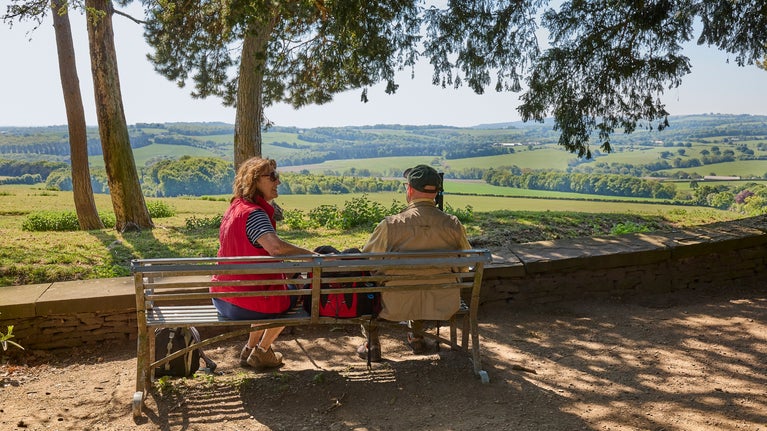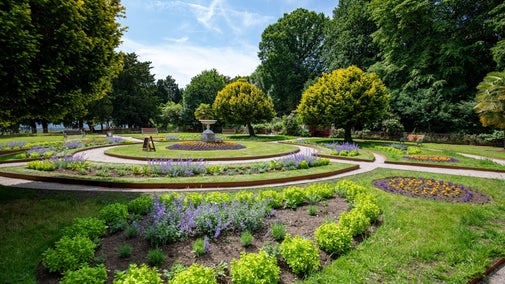
Discover more at Wentworth Castle Gardens
Find out when Wentworth Castle Garden is open, how to get here, things to see and do and more.

Explore centuries of history at Wentworth Castle Gardens, which boasts formal gardens, historically important monuments and a folly that isn’t quite what it seems. From the perfectly manicured Union Jack Garden to a still-recovering parkland that reflects Yorkshire's industrial heritage, there's plenty to see and do at these special gardens, just a stone’s throw from Barnsley.
This almost ancient castle is the crowning glory of a visit to Wentworth Castle Gardens. Although it looks medieval, this folly was actually completed in 1731 by Thomas Wentworth.
Born out of a fierce family rivalry, the folly was designed to give the impression that the Wentworth family had lived here for centuries. Today it’s a peaceful place to enjoy a picnic, surrounded by medieval-style turrets.
~
Thomas Wentworth created the landscape at Wentworth to showcase his wealth and status, and the Union Jack Garden is no different. This 18th-century wilderness garden was planted in 1713. Its distinctive criss-cross pattern marks the union of England and Scotland in 1707. It was largely replanted in 2005.
Named after the Head gardener in the 18th century, this garden offers views across the wider countryside and colour in every season. Enjoy a myriad of smells and textures as you weave through this space on your way towards the rest of the formal gardens.
The gardens are home to several collections of Magnolias, Williamsii Hybrid Camellias, Species Rhododendrons and Hardy Hybrid Rhododendrons, including three national collections. That’s over 100 different Magnolias and 300 different wild rhododendrons.
Between these and the Azalea Garden, the result is a vibrant and colourful spring and summer with large spreads of colour, delicate floral patterns and in some cases, fur lined leaves.

Framed by the trees, this monument has a powerful story to tell. Originally erected by Thomas Wentworth, it was later dedicated by his son William to Lady Mary Montagu in honour of her efforts to inoculate children against smallpox.
A symbol of Mary’s achievements, it's believed to be the oldest monument in the country dedicated to a non-royal woman.
Wentworth Castle Gardens is an oasis of calm, and there’s nowhere more peaceful than Lady Lucy’s Walk, an avenue of towering lime trees. Believed to have been named after one of Thomas Wentworth’s daughters, this line of trees stretching through the garden was planted around the time of the First World War.
As the next generations of the Wentworth family took over the estate, they sought to modernise Wentworth Castle Gardens. The Victorian era saw the Vernon-Wentworths move in, creating an impressive conservatory to grow unusual and exotic plants. This was among the first places in the country to have electric lighting – even before Buckingham Palace.

The grand house at the centre of this estate is not regularly open to the public, but is an integral part of the Wentworth story. Previously known as Stainborough Hall, the original Stuart house was built in the 1670s.
This great house has undergone a number of major changes since then, with a Baroque wing added from around 1709, a Palladian-style wing added in the 1760s and a Victorian wing added in the 1890s.
Today the house is home to Northern College, a pioneering adult education institution.
As you look out over the parkland, you’re looking at centuries of industrial history. A landscape shaped by coal mining, and a garden built by the Wentworth family from the profits of Yorkshire coal.
You can see the impact of mining on the landscape here, including Ivas Wood, the parkland woods replanted in the 20th century to ‘regreen’ the area after mining had taken its toll on the land.
Our gardens and parkland provide homes for lots of different wildlife, including deer and wild birds.
Old buildings, such as Stainborough Castle, are ideal roosting sites for bats. There are four species using roosts within the castle, including the brown long-eared bat, noctule, common pipistrelle and Natterer’s bat.
Various varieties, such as the red-tailed and buff-tailed bumblebee, can easily be spotted in the flower gardens.
Can you spot the deer in the parkland? There are around 150 deer – 61 fallow deer and five bucks and 85 red deer and one stag called Bertie – going about their daily business of grazing and sleeping.
Throughout June and July, they will be starting to give birth so you may see the young in the parkland. The mother deer like to leave their young in a nice shady spot to rest so it's perfectly normal to see a fawn or calf relaxing on their own.
In the parkland the 'scratchy sweet' melodic song of the blackcap is often heard, although the birds usually hide under cover. Similarly, the two-note song of the chiff-chaff is a common sound.

Find out when Wentworth Castle Garden is open, how to get here, things to see and do and more.
There are sixty acres of gardens to explore, created over four centuries. Don’t miss the carefully designed views across the beautiful surrounding parkland.

Stories of power, wealth and politics, family infighting, misery and hope can be found all around Wentworth Castle Gardens – you just need to know where to look.

Wentworth Castle Gardens welcomes all well-behaved dogs and their humans, so here are some top tips for bringing your four-legged friend on a day trip.

Take a peek inside the grand house at the centre of the estate on a select number of volunteer-led tours through Wentworth Castle, now Northern College.
